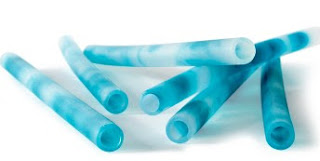Earth Day drinking? Try GoSili reusable straws
Five million plastic straws are thrown away in the U.S. every day, according to GoSili, a brand promoting reusable silicone drinkware in its "Ocean Collection". Moreover, they cite that 100 bilion disposable cups go into landfills annually; the average person consumes 1,769 particles of plastic every week just from drinking water (ugh!); and by 2050, there will be more plastic in the oceans than there are fish.
This Earth Day, April 22, let’s make a commitment to helping the planet. And the plastic in the ocean is a smashing start.
I have written before about reusable straws, which I wholeheartedly endorse. Straws are helpful for many of us who have dental issues and don't want juice or soda to stain our teeth. Sometimes they help older people with more sensitive digestive systems or young children drink their milk - so I am not anti-straw.
This brand is sustainable and fun - I received artsy blue and seagreen “Arctic” and “Indian” Ocean 20-oz reusable cups. One percent of each purchase is donated to ocean cleanup and conservation. If you don't yet know about all the plastic waste in the ocean, the Great Garbage Patch in the Pacific for one and the North Atlantic Garbage Patch for another, then read up. Silicone does not leech chemicals into your food the way plastic does. While silicone may have its detractors, environmentalists consider it a much better option than plastic.
The GoSili line is produced with 100 percent platinum silicone, is dishwasher-safe and non-toxic. The company will also recycle your silicone products if your local recycling center does not do so.
Shop for cute tumblers, kids' cups and more at the Gosili site. Prices start about $10 and go to about $19.
Photos used with permission, courtesy of GoSii.





Comments
Post a Comment